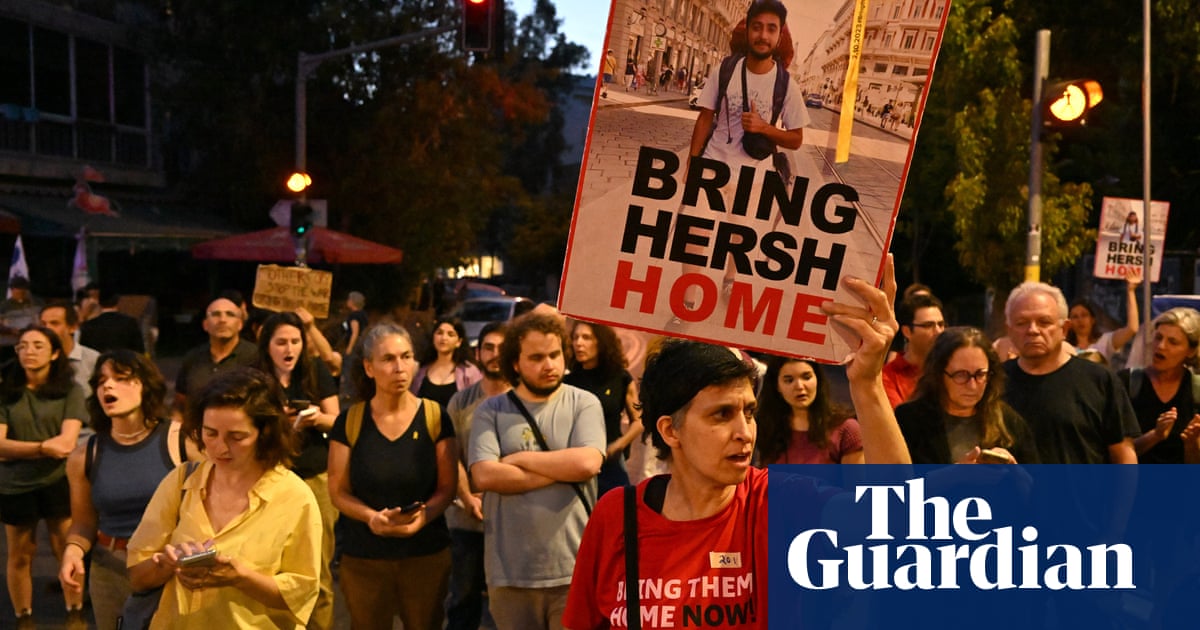
The families of Israeli hostages held in Gaza have put renewed pressure on Benjamin Netanyahu to restart negotiations for a temporary ceasefire in exchange for the release of their loved ones, as Israeli authorities said they were making progress in preparations for a ground assault on Rafah.
After the release by Hamas of a hostage video of the Israeli-American citizen Hersh Goldberg-Polin, police and protesters clashed outside the Israeli prime minister’s Jerusalem home, and demonstrators lit fires, set off fireworks and swarmed the car of the far-right security minister, Itamar Ben-Gvir.
Speaking under duress in the proof-of-life video posted on Hamas’s Telegram account, Goldberg-Polin accused Israel’s government of abandoning the people being held hostage by Hamas and claimed that 70 captives had been killed in Israel’s bombing campaign.
R Adm Daniel Hagari, a spokesperson for the Israel Defense Forces (IDF), described the video as “an urgent call for action”, adding that “until Hamas releases our hostages the IDF will continue to pursue Hamas everywhere in Gaza”.
Israeli officials including Netanyahu have claimed that military force, including a planned invasion of Gaza’s southernmost city of Rafah, will allow Israel to defeat Hamas militants and bring hostages home.
Hamas and other militant groups took 250 people hostage on 7 October when they overran towns and kibbutzim next to Gaza, killing an estimated 1,136 people. After intensive negotiations mediated by Qatar and Egypt, 105 were released as part of a hostage deal last November in exchange for a pause in fighting.
“Despite preparations to enter Rafah, until now we saw lots of military pressure, and my brothers-in-law are still not back home,” said Dalia Cusnir, whose husband’s brothers are being held in Gaza. “This will only come through a deal.”
Cusnir said she feared Israeli officials had not acted quickly enough to secure the release of the remaining hostages, following reports – including some from Hamas – that large numbers of those that were held are no longer alive. “It feels from outside that they’re not making every effort,” she said of the Israeli government.
Israel’s war cabinet was due to convene on Thursday to discuss plans to restart talks as well as the potential ground invasion of Rafah. On Wednesday a government spokesperson said Israel was “moving ahead” with a ground operation, but gave no timeline. An estimated 1 million people are seeking shelter in the city after Israeli bombardments levelled other urban centres in Gaza.
A senior member of Hamas’s politburo, Khalil al-Hayya, told the Associated Press on Thursday that the group was willing to agree to a five-year ceasefire with Israel and dissolve its military wing with the establishment of an independent Palestinian state along borders established before 1967.
It is unlikely Israel would consider such a scenario. It has vowed to crush Hamas after the 7 October attacks, and the country’s leadership is adamantly opposed to the creation of a Palestinian state on lands Israel captured in the 1967 war.
Recent talks to facilitate a second pause in fighting in exchange for the release of 40 hostages including women and elderly and sick people, all but collapsed over Hamas’s demands for the permanent withdrawal of Israeli forces from Gaza as well as the return of Palestinians to the north of the territory.
“Israel calls Hamas’s demands delusional and they are not – it makes perfect sense from the point of view of anyone in Gaza,” said Gershon Baskin, the Middle East director of the International Communities Organisation and a former Israeli negotiator for the prisoner exchange deal that freed the IDF soldier Gilad Shalit, held captive by Hamas for five years.
“Netanyahu has an interest in prolonging the war,” Baskin said. “[Hamas’s] biggest bargaining card is the 136 hostages, and they’re not going to give them up for anything less than ending the war.”
Qatari mediators recently said they were reconsidering their role in the talks, in an unusual public rebuke expressing “deep frustration” with statements from Israeli officials. Israeli mediators went into negotiations in Doha and Cairo in recent months hamstrung, said Baskin, with a strict brief that allowed for little flexibility and limited progress.
The former Israeli peace negotiator Daniel Levy said freeing the hostages was “clearly not the priority” of Netanyahu and his cabinet.
Netanyahu, he said, had “actively worked to undermine the talks” by providing a restricted mandate for discussions and attacking the Qatari mediators, as well as having “a constant commitment to continuing the war effort.”
A senior US administration official said on Thursday that Hamas’s leader, Yahya Sinwar, who is seen as the mastermind behind the plan to seize captives on 7 October, “has made the decision he’d rather hold [the hostages] rather than securing a ceasefire”.
“There’s a deal on the table. It meets nearly all of the demands that Hamas had,” the official added. “What they need to do is release the vulnerable category of hostages to get things moving.”
The newspaper Haaretz reported that one proposal under discussion by Israeli officials in Tel Aviv was an agreement that would result in all the hostages being released, including men and those of military age, in exchange for a mass release of Palestinian prisoners.
Hamas said in a statement that it had “offered flexibility” during the talks but blamed a lack of progress on “the intransigence and procrastination of Netanyahu and his government”. Demands for a permanent ceasefire, the withdrawal of Israeli forces and the return of Palestinians to northern Gaza remained the same, the group said.